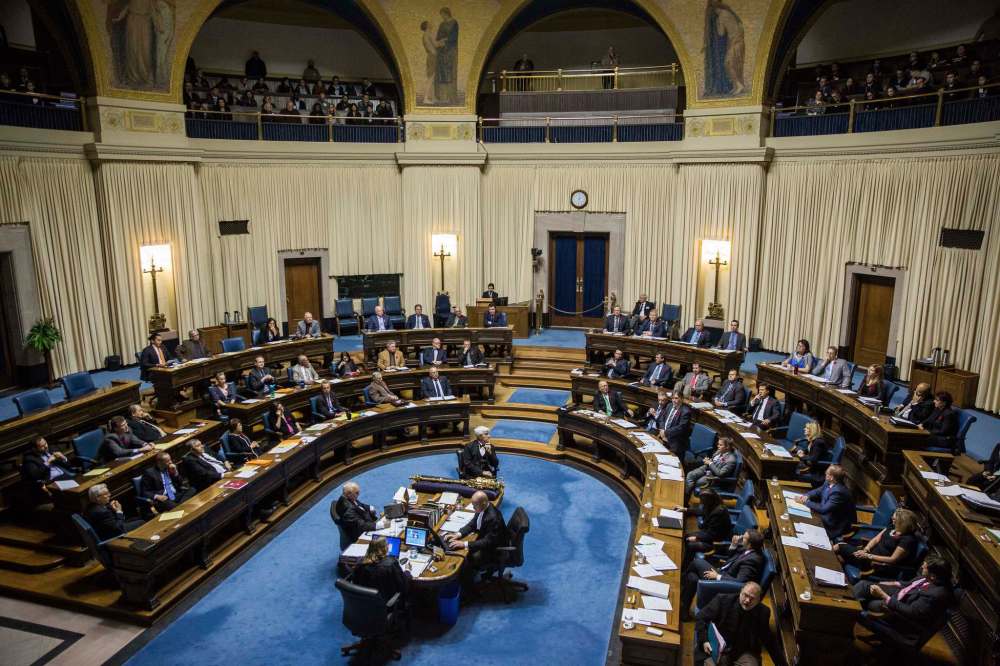Tension mounting over economy’s fate as Pallister gang rides back to legislature
Advertisement
Read this article for free:
or
Already have an account? Log in here »
To continue reading, please subscribe:
Monthly Digital Subscription
$0 for the first 4 weeks*
- Enjoy unlimited reading on winnipegfreepress.com
- Read the E-Edition, our digital replica newspaper
- Access News Break, our award-winning app
- Play interactive puzzles
*No charge for 4 weeks then price increases to the regular rate of $19.00 plus GST every four weeks. Offer available to new and qualified returning subscribers only. Cancel any time.
Monthly Digital Subscription
$4.75/week*
- Enjoy unlimited reading on winnipegfreepress.com
- Read the E-Edition, our digital replica newspaper
- Access News Break, our award-winning app
- Play interactive puzzles
*Billed as $19 plus GST every four weeks. Cancel any time.
To continue reading, please subscribe:
Add Free Press access to your Brandon Sun subscription for only an additional
$1 for the first 4 weeks*
*Your next subscription payment will increase by $1.00 and you will be charged $16.99 plus GST for four weeks. After four weeks, your payment will increase to $23.99 plus GST every four weeks.
Read unlimited articles for free today:
or
Already have an account? Log in here »
Hey there, time traveller!
This article was published 27/02/2017 (3173 days ago), so information in it may no longer be current.
The showdown is coming: Premier Brian Pallister and Finance Minister Cameron Friesen as Wyatt Earp and Doc Holliday facing off with the public-sector unions.
The next sitting of Manitoba’s legislature begins Wednesday, but the austerity-fuelled fireworks won’t begin until the Tories finally table expected legislation that could freeze public-sector wages and even open up existing collective-bargaining agreements.
“We’re looking to have a showdown in the coming months,” Christopher Adams, a political scientist at St. Paul’s College, warned Monday. “They aren’t really willing to open the public purse with the public-sector unions.”

No one yet knows what the labour legislation will say, but Pallister and Friesen have said repeatedly that it’s coming, and soon.
“Discussions with staff from the province have been ongoing and we expect them to continue,” Manitoba Federation of Labour president Kevin Rebeck said. “We have not received any clarification on the content or timing of legislation.”
Pallister campaigned last year on a promise to protect front-line services, but has yet to define what that means.
The budget, the date still to be announced, will fill in many of the blanks.
“They want to cut back on spending. The premier has really indicated where he’s going, to reduce the deficit,” Adams said. “He’s not going to bail out, to infuse, Manitoba Hydro with a lot of public money.”
There is unease over the depths of the cuts Pallister could impose.
“It’s really deficit-infused austerity we’ve been seeing,” said Molly McCracken, Manitoba director for the Canadian Centre for Policy Alternatives. “We could really stagnate and stall our fragile economy.”
A harbinger of what’s likely to come was the announcement that the province’s share of funding for the public school system would rise by one per cent, the smallest increase since the 1990s.
Given that level of support, what kind of grants can the universities and colleges realistically expect to get? Will Pallister lift the cap that keeps tuition fees from increasing beyond the rate of inflation? He’s already laid the groundwork for a greater reliance on bursaries and scholarships with what appears to be more significant amounts of public money — but getting that money now requires schools to raise $2 for every public dollar, rather than simply matching donations, as is the case now.
The province refuses to sign on with the federal government’s health-care funding agreement, which would deliver barely half the increase in transfer payments that Manitoba insists it needs. Pallister’s intransigence leaves Prime Minister Justin Trudeau’s offer of $40 million for mental health and home care on the table, for the time being.
Not that there’s a lot of talk in Manitoba about a carbon-pricing strategy these days, but it’s something the Pallister government has promised.
The next quarterly report usually gets released along with the budget; just how deep a deficit hole do Manitobans face? Will the credit-rating agencies hit us again with yet another downgrade?
And hanging over it all, the danger of major spring flooding threatening to throw all of Pallister’s spending plans out of whack.
McCracken fears the implementation of the government’s plans to slash red tape.
“We’re really concerned about the government taking away protection,” she said, adding Pallister should release last year’s value-for-money audit report in its entirety, and define “value.”
Meanwhile, the official Opposition is in disarray. Theoretically, the NDP has an unofficial leadership race underway, though evidence of its existence is scant. Two MLAs are gone: Kevin Chief to the private sector; Mohinder Saran now sitting as an independent after the caucus booted him out over sexual harassment allegations.
Can interim leader Flor Marcelino be any more effective than she’s been so far? Will NDP leadership candidates emerge as forces in the house?
The Liberals also have their own leadership race, and while interim leader Judy Klassen has been effective on some issues, there are still only three Grits with seats.
nick.martin@freepress.mb.ca

Nick Martin
Former Free Press reporter Nick Martin, who wrote the monthly suspense column in the books section and was prolific in his standalone reviews of mystery/thriller novels, died Oct. 15 at age 77 while on holiday in Edinburgh, Scotland.
Our newsroom depends on a growing audience of readers to power our journalism. If you are not a paid reader, please consider becoming a subscriber.
Our newsroom depends on its audience of readers to power our journalism. Thank you for your support.

